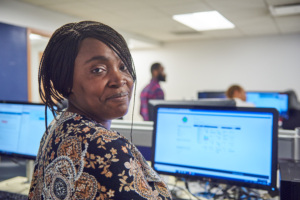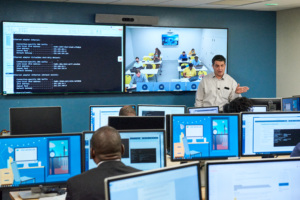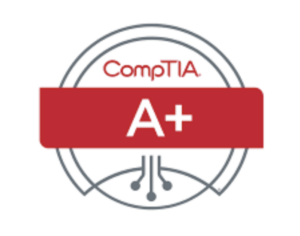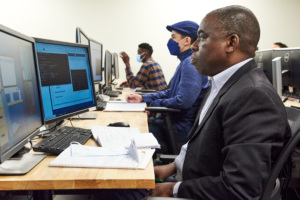Forbes Highlights Per Scholas as Organization Leading the Way for Apprenticeships
In December, Forbes highlighted Per Scholas as one of three organizations who are leading the way for apprenticeships. With technology constantly advancing and changing, employers cannot keep up with the demand for talent that are equipped to deal with these challenges. Apprenticeships are one way to bridge this talent gap. So far, Per Scholas has placed 47 apprentices at insurance company Nationwide over the last three years and over 80% of those apprentices move to full-time positions.
Read more about the future of apprenticeships at Per Scholas and beyond here!
Per Scholas Writes Letter of Support to the House Committee on Education and the Workforce
Per Scholas Featured in Fast Company, Highlighting Our Integration of Google Certifications into Our Skills-Based Training
Per Scholas was featured in an article published with Fast Company, in which Lisa Gevelber, founder of Google’s certificates program, discussed the ways in which skills-based training can open up opportunities.
For years, many tech industry leaders have complained about their inability to find workers with the skills they need. Google’s certificate program has been an excellent solution, offering prospective technologists a rapid, low-cost way to gain the specific skills needed to take on roles within the tech industry.
Google’s career certificate program has now been integrated into the teaching at a number of colleges and school systems, as well as into community-based nonprofits, including Per Scholas, who do cohort based programs and provide coaching along the way for learners earning certificates. Per Scholas has partnered with Google since 2012, and we offer Google IT Support Professional Certificates earn-able through our IT Support training program, which are also available for Per Scholas alumni for up to three years post-graduation.
Read the full article here!
Per Scholas Spotlighted in CIO: Revolutionizing Tech Training, Filling Skills Gaps, and Redefining Diversity in the IT Workforce
Per Scholas Alum and Director of Business Solutions, Wayne Wilson, recently spoke with CIO about how Per Scholas’ rigorous training sets learners up for ultimate success in the technology industry. Our tuition-free model equips learners with important skill sets and professional development training through a fast-tracked program to get them into the job market as soon as possible – all without incurring years of college debt. Having gone through the rigorous enrollment and training process, Per Scholas learners emerge as top tier talent that are armed with both the practical skill sets and professional development needed to thrive in a career in tech.
After training is complete, Per Scholas alumni work closely with our Business Solutions Team, which strives to make meaningful pairings between alumni and hiring businesses. Per Scholas collaborates with partners and other employers to identify job openings that align with training efforts, and connect them with learners who have completed relevant training. Alumni also have access to internal resources that help them find and navigate a new career.
Finally, in our ongoing mission to promote DEIB in the tech industry, Per Scholas works closely with organizations to break down misconceptions and stereotypes around traditional hiring structures, and encourage skills-based hiring.
CIO also interviewed Marie Cari, a first-generation immigrant from Albania and Per Scholas Software Engineering graduate. Marie now works as a Software Engineer at Bank of America, and is grateful for her experience at Per Scholas in helping her expedite the learning process without incurring debt. “I had compared going to Per Scholas to staying in college and going the traditional route,” Marie told CIO. “However, Per Scholas was able to educate me and get me ready for the corporate world in every aspect within months. I didn’t have to go into college debt like my friends did or wait years in order to get the career I wanted,” she reflected.Read more on Wayne’s reflections about our training and Marie’s interview here!
People of Color in Tech: Empowering Diversity
In the ever-changing world of technology, there’s a growing awareness of the importance of diversity, equity, inclusion, and belonging (DEIB) in driving innovation and progress. However, challenges still persist for people of color trying to enter the tech industry. From underrepresentation, barriers to entry, and biases in the workplace, the journey for people of color in tech can be challenging.
However, amidst these challenges, there are opportunities for positive change and growth. This article takes a closer look at the issue, examining the current state of diversity in the tech industry and shining a light on the pivotal role played by organizations like Per Scholas in supporting aspiring technologists.
 Per Scholas is committed to creating a more diverse and inclusive tech workforce by creating opportunities and connections for women and people of color, groups greatly underrepresented in IT employment today. We envision a tech workforce as diverse as the customers it serves and, in order to achieve this, it is important to understand and break down the barriers that deter diverse individuals from entering the tech industry.
Per Scholas is committed to creating a more diverse and inclusive tech workforce by creating opportunities and connections for women and people of color, groups greatly underrepresented in IT employment today. We envision a tech workforce as diverse as the customers it serves and, in order to achieve this, it is important to understand and break down the barriers that deter diverse individuals from entering the tech industry.
Tech Industry at a Glance and Understanding the Current Landscape
Unfortunately, the tech industry faces a significant diversity gap, with statistics showing a notable underrepresentation of people of color within its workforce. Understanding this situation is the first step toward implementing effective solutions.
According to the 2023 Tech Report, approximately 63% of employees in the U.S. technology sector are white, 20% identify as Asian American, 8% as Hispanic or Latino, 7% as Black, and less than 1% as Native Hawaiian, Pacific Islander or Native American.
While there has been a recent emphasis on promoting DEIB within workplaces, especially in the historically white, male-dominated tech field, there’s still much work to be done in order to reduce discrimination, bolster opportunity, and promote DEIB within the workplace.
The reasons behind these disparities are complex and interconnected, rooted in historical and systemic inequalities resulting from discriminatory policies. These inequalities negatively affect people of color in the United States and can limit opportunities for those in communities of color.
Unequal Access to Resources
In the U.S., not everyone has the same opportunities to learn. Persistent systemic inequalities mean that communities of color are more likely to experience poverty, impacting their access to essential resources, including quality education.
Limited educational opportunities, outdated school resources, and understaffed schools hinder the development of necessary skills and knowledge, particularly in STEM fields. Despite incredible potential and talent in communities of color, unequal access to resources and educational opportunities makes it more challenging for people of color to break into certain fields, especially in STEM.
Wage Gap
Despite improvements in education levels among Black Americans in recent decades, a racial wage gap still exists across various industries within the U.S. Studies reveal that employees of color can earn up to 30% less than their white counterparts for the same roles, regardless of performance, education, age, skill level, and gender.
This wage gap is more pronounced in certain industries, including the tech sector, where white employees, on average, earn 6.95% more than Black employees for the same jobs. This difference in pay can be daunting, frustrating, and prohibitive for those looking to break into the tech field.
U.S. Digital Divide
Another factor that influences the tech industry’s diversity gap is the U.S.’s digital divide. The digital divide refers to the unequal access to digital technology, including the internet, that exists in this country.
According to a report by the Pew Research Center, around 1 in 10 Americans (30% of the population) report experiencing problems connecting to or accessing the internet at their homes at least some of the time, while 9% report experiencing this lack of access frequently or all the time.
Due to a number of systemic factors, minority communities, especially in lower-income areas, are more likely than white communities to lack access to high-speed internet and modern computing devices. Statistics from this report show that, while 80% of White adults have access to home broadband, this is true for only 71% of Black adults and 65% of Hispanic adults.
This lack of access limits the ability of people in affected communities to gain digital skills and participate in online learning, certifications, and tech-related activities – all of which are important to launching careers in tech.
Workplace Culture
While increasing opportunities for people of color in the tech industry is crucial, there must be an equal focus on creating an inclusive culture within tech workplaces where employees feel both valued and empowered. Despite recent national attention on DEIB in the workplace, the tech industry still has progress to make in terms of inclusivity.
A 2022 Dice report found that 24% of tech professionals report experiencing direct racial discrimination in the workplace within the last year, and 53% of Black tech professionals say they think racial inequality occurs either very frequently or frequently – higher than the percent reported in any other group.
Some tech companies also lack inclusive policies and practices, making it difficult for employees from diverse backgrounds to succeed. Discrimination and bias in the hiring process can also lead to underrepresentation of minorities in tech companies. Thus, inclusive policies, such as diverse hiring panels and unbiased performance evaluations, are essential for creating a more inclusive workplace.
Lack of Mentors and Role Models
Finally, the perception of the tech industry as predominantly white and male, although based in fact, creates a self-perpetuating cycle. People of color may feel discouraged from pursuing tech careers because of the existing lack of representation.
The lack of diversity means that minority technologists have far fewer mentors and role models from similar racial backgrounds. Without guidance and inspiration, people may struggle to envision themselves succeeding in the tech industry.
Addressing the lack of diversity in the U.S. tech industry requires a comprehensive approach. Critical steps include promoting equal access to education, bridging the digital divide, implementing inclusive hiring practices, and cultivating supportive work environments.
Challenging societal stereotypes and biases is essential for breaking down barriers, enabling talented technologists from all backgrounds to enter and thrive in the tech field.
Per Scholas’ Commitment to Diversity
Per Scholas is determined to make the tech world more accessible for everyone, especially those facing challenges and barriers to entry. We picture a tech workforce that reflects the diversity of the people it serves. Recognizing that diverse talent is everywhere but opportunity is not, we believe a successful workforce begins with fair access to education. That’s why we offer top-notch, accessible, and cost-free tech education to those typically underrepresented in the tech industry.
accessible for everyone, especially those facing challenges and barriers to entry. We picture a tech workforce that reflects the diversity of the people it serves. Recognizing that diverse talent is everywhere but opportunity is not, we believe a successful workforce begins with fair access to education. That’s why we offer top-notch, accessible, and cost-free tech education to those typically underrepresented in the tech industry.
Since 2016, Per Scholas’ Diverse by Design initiative has been partnering with employers to have practical conversations about DEIB in tech. Starting as a discussion series, Per Scholas Diverse by Design aims to serve as a space for tech leaders and workforce developers to share best practices and ideas for attracting, retaining, and developing skilled professionals from diverse communities. Events under this initiative bring together hundreds of participants across the country, guided by a National Advisory Board with members from various tech-related organizations.
 Through focused discussions and advice from DEIB experts, Per Scholas Diverse by Design helps C-suite leaders make valuable and socially impactful business decisions. The initiative also offers organizations tailored training tracks and talent sourcing solutions, allowing them to meet their own talent demands while simultaneously transforming the diversity landscape within their company.
Through focused discussions and advice from DEIB experts, Per Scholas Diverse by Design helps C-suite leaders make valuable and socially impactful business decisions. The initiative also offers organizations tailored training tracks and talent sourcing solutions, allowing them to meet their own talent demands while simultaneously transforming the diversity landscape within their company.
At Per Scholas, we are proud that 85% of our learners identify as people of color. Our specialized courses, like the Per Scholas Columbus Tech Women of Color (TWOC) Tech Fundamentals course, aim to boost diversity in tech. Open to women of color, this course was designed with the goal of understanding how to overcome the barriers women and people of color face when entering the tech industry, and to help unlock the potential of female and POC learners.
Last year, Per Scholas partnered with executive advancement company Guerrero Media to create The Code Breakers: Women in Tech campaign. Each week, this campaign highlights exemplary women who have built successful careers working in tech, breaking down barriers and inspiring other minority technologists to pursue paths in tech. Per Scholas also works closely with local workforce development programs, such as Goodwill and Year Up, to recruit talented, diverse individuals, and launch them on paths to success in the tech industry.
advancement company Guerrero Media to create The Code Breakers: Women in Tech campaign. Each week, this campaign highlights exemplary women who have built successful careers working in tech, breaking down barriers and inspiring other minority technologists to pursue paths in tech. Per Scholas also works closely with local workforce development programs, such as Goodwill and Year Up, to recruit talented, diverse individuals, and launch them on paths to success in the tech industry.
Success Stories: People of Color Thriving in Tech with Per Scholas
As mentioned above, a crucial step in bringing more diversity to the tech field, beyond simply preparing learners with the skills to launch their careers, is showing people from various minority-in-tech backgrounds that success is possible for them in the tech field. In a 2021 study, the Pew Research Center found that over half of Hispanic Americans they surveyed felt that young Hispanic people would be a lot more likely to pursue a STEM degree if they saw examples of high achievers in the field who were Hispanic.
Carla Davis, a Black woman and recent graduate of Per  Scholas’ AWS re/Start course, shared her thoughts on being a woman of color in the field – the smallest minority represented in tech. “I saw that a lot of minorities are not in tech and we didn’t have the guidance or the mentoring, so we kind of opt-out and don’t think of it as a field that we’re used to seeing,” Carla reflected. “Hopefully, I can be some kind of example for others, but it was extremely difficult to get my foot in the door. The instructors and courses at Per Scholas showed me that if I worked hard, it is possible to get the certifications and get the jobs…Even if you don’t have the same starting place, you can learn it.”
Scholas’ AWS re/Start course, shared her thoughts on being a woman of color in the field – the smallest minority represented in tech. “I saw that a lot of minorities are not in tech and we didn’t have the guidance or the mentoring, so we kind of opt-out and don’t think of it as a field that we’re used to seeing,” Carla reflected. “Hopefully, I can be some kind of example for others, but it was extremely difficult to get my foot in the door. The instructors and courses at Per Scholas showed me that if I worked hard, it is possible to get the certifications and get the jobs…Even if you don’t have the same starting place, you can learn it.”
Joseph Diaz, a Black and Hispanic graduate of Per Scholas New York’s Network Support course who now works as a Team Lead in Quality Assurance and DevOps at Barclays, had never reflected much on his race before starting his career in tech. After growing up in a highly diverse Bronx neighborhood, he was surprised to find himself as one of the only Hispanic technologists in a number of the tech industry roles he took on. “[At my job], it’s kind of interesting to be the only Diaz on the mailing roster,” Joseph said. “I don’t see a lot of similar last names or people who I think are Hispanic around me. But I feel like if I give that meaning to my name, imagine what other people could do for themselves. Other people in my neighborhood who are of Black or Hispanic origins ask about my career; it kind of gives them a direction. [They say] ‘hey, I want to do that too because you’re doing it.’ It pushes that boundary.”
career in tech. After growing up in a highly diverse Bronx neighborhood, he was surprised to find himself as one of the only Hispanic technologists in a number of the tech industry roles he took on. “[At my job], it’s kind of interesting to be the only Diaz on the mailing roster,” Joseph said. “I don’t see a lot of similar last names or people who I think are Hispanic around me. But I feel like if I give that meaning to my name, imagine what other people could do for themselves. Other people in my neighborhood who are of Black or Hispanic origins ask about my career; it kind of gives them a direction. [They say] ‘hey, I want to do that too because you’re doing it.’ It pushes that boundary.”
Taking the Leap with Per Scholas: Steps to Empower People of Color in Tech
Per Scholas is committed to creating a tech workforce as diverse as the communities it serves. We acknowledge that there’s still much work to be done in order to reduce discrimination, boost opportunities, and promote DEIB in the tech industry.
The promotion of DEIB in the tech workplace begins with opportunity and intentionality. By understanding the barriers that keep people of color from entering the tech field, we can begin to break them down.
While the IT field still has a long way to go to become totally  diverse and inclusive, Per Scholas is dedicated to driving this change. We aim to transform the technology landscape by opening pathways of opportunity for diverse talent and helping other organizations do the same.
diverse and inclusive, Per Scholas is dedicated to driving this change. We aim to transform the technology landscape by opening pathways of opportunity for diverse talent and helping other organizations do the same.
Empowerment starts with education and opportunity. Together, we can build a future where everyone, regardless of their background, can thrive in the world of technology.
Apply now to Per Scholas and be a part of the change.
Per Scholas Participates in JPMorgan Chase Panel: “The Opportunity to Expand Apprenticeships – A Field + Funder Conversation”
Earlier in November, Per Scholas received a $1 million grant from JPMorgan Chase to help expand apprenticeship opportunities for learners and scale programs for in-demand occupations ahead of National Apprenticeship Week.
We are one of four organizations to receive the philanthropic commitment totaling $3.5 million, and as a recipient, Per Scholas participated in a virtual panel discussion, “The Opportunity to Expand Apprenticeships – A Field + Funder Conversation,” on Thursday, November 16.
Per Scholas Chief of Staff Tamara Johnson joined Workforce Matters, JPMorgan Chase, Apprenticeships for America, and partners from Apprenti and New America for the event. The panelists discussed the policies and systems important to supporting the learn and earn ecosystem; promising practices that advance equitable access to and outcomes from apprenticeship programs; and how funder investments might help further expand apprenticeship opportunities.
Per Scholas Publishes First Report on the Future of Work in America
OnePoll conducted a random double-opt-in survey of 650 C-suite executives, 100 hiring managers, and 1,500 office workers, commissioned by Per Scholas. This is the first time Per Scholas has commissioned a survey of this magnitude. This survey revealed the extent to which every role will require a level of tech knowledge in the next 10 years.
Results showed 98% of C-suite executives feel tech skills are likely to be essential across every work sector in the next 10 years — with three-quarters of employees (75%) acutely aware that tech knowledge will be a must-have for them.
And while we may have a decade until the tech skills necessity infiltrates previously non-technological working roles, the data showed a majority of workers aren’t waiting to be caught cold — 57% are currently upskilling (acquiring new knowledge or competencies) either through their employer or individual means.
Download the full report here.
Per Scholas Awarded $1 Million Grant from JPMorgan Chase to Scale Apprenticeship Program
Per Scholas is excited to announce that we received a $1 million grant from JPMorgan Chase to help expand apprenticeship opportunities for learners and scale programs for in-demand occupations.
We are one of four organizations to receive the philanthropic commitment totaling $3.5 million. This commitment will support Per Scholas in developing and piloting a new cybersecurity apprenticeship initiative, which addresses a critical labor shortage while testing a sustainable, innovative, earn-and-learn approach to achieving economic mobility.
“We are incredibly grateful for this generous investment, which will increase our impact and create economic mobility for thousands of individuals in communities across the country, including an anticipated $80M generated in first-year wages for new cyber technologists historically underrepresented in the cybersecurity space,” said Per Scholas President & CEO Plinio Ayala. “We are excited to partner with employers across the country to make this program a success and help close the cybersecurity skills gap.”
This support will also help us expand our existing suite of cybersecurity training programs to reach more learners annually, recruiting unemployed and underemployed talent from Boston, Charlotte, Chicago, Columbus, Dallas, Detroit, Los Angeles, Newark, St. Louis and Greater Washington region.
Empowering Military Service Members, Veterans and Spouses in Tech
Every year, nearly 200,000 men and women transition from U.S. military service to civilian life. Only 1 in 4 has a job lined up when they return — creating the daunting task of translating their military skills into civilian employment opportunities. Per Scholas, in partnership with TEKsystems, is leading the way in supporting the military community by providing tuition-free, full-time immersive training for in-demand technical skills that lead to industry-recognized credentials. This innovative approach empowers military service members, veterans and spouses to build successful careers in the tech industry by not only providing technical training but also fostering business professional skills, providing learner support and direct connections to employers, and creating a clear path to career advancement in tech.
Demand-Driven Training for Military Service Members, Veterans and Spouses
Per Scholas’ no-cost training program is designed to equip participants with in-demand technical skills and is centered around industry-recognized credentials, ensuring that graduates are well-prepared to meet the specific needs of the job market. TEKsystems, a global provider of business, technology and talent solutions, is committed to creating diverse, equitable and inclusive workplaces in the tech industry. Our partnership with TEKsystems addresses the lack of diversity, including the underrepresentation of veterans, in the industry and the demand for technical talent by combining resources, leaning into strengths, and partnering to widen our reach and deepen our impact for individuals, businesses, and communities. This demand-driven approach ensures that military service members, veterans and spouses are not simply trained but trained for success in real-world tech roles.
Business Professional Skills for the Win with a Holistic Approach
Recognizing that technical proficiency is just one piece of the puzzle, Per Scholas dedicates 20% of classroom time to career coaching and the development of business professional skills. Beyond funding and training, TEKsystems supports our learners – through networking with our learners and alumni, career coaching, and participating in various campus events. We want to build upon the skills learned in their military experience and help them thrive and adapt in any workplace. With our work to support military service members, veterans and spouses, individuals in the military community can gain technical knowledge and soft skills, coupled with their incredible military experience, to position them for continued career success.
Transitioning to a new career can be challenging, and Per Scholas and TEKsystems acknowledge the need for comprehensive support. Per Scholas provides learner support services that include benefit navigation, financial coaching, and wellness support, ensuring that learners can persist through the training program. This holistic approach addresses not only the technical aspects but also the personal and financial challenges military service members, veterans and spouses may face during their career transition.
Connecting Directly with Employers
One of the most distinctive features of Per Scholas’ training is our direct connection to employers. In the past year alone, over 850 companies hired Per Scholas graduates, with more than 1,000 hires through TEKsystems, demonstrating the high demand for the skills and credentials these military service members, veterans and spouses bring to the job market. This direct link to employers helps ensure that learners have a clear path to employment upon graduation. “I am honored to work with partners including TEKsystems that put hiring from the military community at the forefront in efforts to diversify the tech industry,” stated Per Scholas Director of Veteran Recruitment & Partnerships George Darby. “TEKsystems understands that hiring military service members, veterans and spouses is not only the right thing to do, but it’s also a great business decision. Partners that understand the unique skills and value this talent pool brings are ahead of the competition.”
TEKsystems: Committed to Creating Opportunities for Veterans
TEKsystems is a valuable partner in this endeavor. Having helped more than 20,000 military service members, veterans and spouses since 2013, they understand the distinctive skills within the military community and continue to make a real impact. As a Department of Defense-authorized SkillBridge employer, a program for service members to transition to a civilian career, TEKsystems leads the way for veterans looking to transition out of the military. Their partnership with Per Scholas demonstrates a shared commitment to diversity and inclusivity in the tech industry, recognizing the immense potential and unique qualities of veterans and their spouses.
As military service members, veterans and spouses transition to civilian life, there’s no doubt they face challenges in finding their next opportunity and meaningful employment. However, Per Scholas and TEKsystems, through their collaborative efforts, are paving the way for military service members, veterans and spouses to thrive in the tech industry. Their commitment to inclusivity and empowerment reflects a changing landscape in the tech industry that celebrates the unparalleled value the military community can bring. With a blend of purpose, partnership, and perseverance, the path to success in the tech industry for our military heroes and their spouses is clearer than ever before.
Understanding and Preparing for CompTIA A+ Certification: A Comprehensive Guide
For those looking to enter into the tech field, specific certifications are necessary to take on most roles. While possessing a traditional 4-year college degree can potentially give applicants a leg up in the job search, certifications are the main requirement for many roles in the field.
Certifications are not necessarily required for all roles, but obtaining certain certifications indicates to hiring managers that you are proficient in those areas covered by the certification exam. Many companies prefer candidates who have certifications, because it validates knowledge of best practices. Furthermore, because certifications need to be renewed regularly, possessing a valid certification indicates that the candidate’s knowledge base is up to date.
The CompTIA A+ is the industry standard for launching IT careers in today’s digital world, and embarking on the journey to earn your CompTIA A+ certification is a pivotal step towards advancing your career in IT. This credential validates your foundational skills and knowledge in IT as well as your ability to problem solve in real-time, and it equips you with the knowledge to fill a wide range of entry-level technology jobs, making you a desirable candidate in the competitive tech job market.
 Per Scholas offers various courses for those looking to either break into or advance their career in tech. We believe in creating opportunities and on-ramps for aspiring technologists so, in addition to all courses and resources being cost-free to our learners, we also cover the costs of all certification exams, including the CompTIA A+. Our courses prepare students for the certification exams for multiple different types of IT certifications, and our IT Support, Desktop Support, and Security Fundamentals courses provide the training and resources learners need to succeed in the CompTIA A+ exam, and cover all exam fees.
Per Scholas offers various courses for those looking to either break into or advance their career in tech. We believe in creating opportunities and on-ramps for aspiring technologists so, in addition to all courses and resources being cost-free to our learners, we also cover the costs of all certification exams, including the CompTIA A+. Our courses prepare students for the certification exams for multiple different types of IT certifications, and our IT Support, Desktop Support, and Security Fundamentals courses provide the training and resources learners need to succeed in the CompTIA A+ exam, and cover all exam fees.
Although the exam is difficult and requires studying and preparation in order to pass, Per Scholas learners are well prepared for the certification process. “It is possible to go from zero to expert, and it has been done over and over again here at Per Scholas,” Per Scholas Dallas IT Support Alumni Deji Adefuye reflected. “Even if you don’t believe in it, someone else believes it and has done it, which means it is possible for you too.”
In this article, we will outline the importance of the CompTIA A+ certification in launching a career in tech, what one can expect on the certification exam, and tips for exam preparation and studying.
Understanding the CompTIA A+ Exam
The CompTIA A+ certification is an internationally-recognized, entry-level qualification in the IT industry. It is issued by the IT association Computing Technology Industry Association (CompTIA), and is widely accepted as an industry standard certification often used to start a career in IT.
According to CompTIA’s website, the CompTIA A+ Core Series requires candidates to pass two exams: Core 1 and Core 2. These exams cover a wide range of content, emphasizing the technologies and skills tech professionals need to succeed in most entry-level IT positions. The certification exam consists of a combination of multiple-choice questions and performance-based questions, and broadly tests an individual’s knowledge of various IT basics. Categories include hardware, software, networking, operating systems, and security.
Series requires candidates to pass two exams: Core 1 and Core 2. These exams cover a wide range of content, emphasizing the technologies and skills tech professionals need to succeed in most entry-level IT positions. The certification exam consists of a combination of multiple-choice questions and performance-based questions, and broadly tests an individual’s knowledge of various IT basics. Categories include hardware, software, networking, operating systems, and security.
Exam format and topics covered
As mentioned above, the CompTIA A+ exam consists of two separate exams, which together cover the broad range of knowledge necessary for most entry-level IT positions. The exam is considered to be “vendor neutral,” which means that passing the exam will “prove competence across a wide range of concepts that can be applied to multiple vendors or platforms.”
The exam itself is updated regularly in order to keep up with the demands of the ever-changing and rapidly evolving tech field. CompTIA updates each of their exams approximately every three years in order to reflect new industry trends and standards, and to ensure that the information they teach is up to date.
In April of 2022, CompTIA updated their A+ exam from the CompTIA A+ 220-1001 (Core 1) and 220-1002 (Core 2) series, which was released in 2019, to the CompTIA A+ 220-1101 (Core 1) and 220-1102 (Core 2) series. The 2019 exam series has since been retired, and those looking to become CompTIA A+ certified this year and in upcoming years should focus their studies on the CompTIA A+ 220-1101 (Core 1) and 220-1102 (Core 2) series exams – note that both the Core 1 and Core 2 exams are necessary to pass. According to CompTIA’s official website, the new exam series places a greater emphasis on the technologies and skills IT pros need to support a remote or hybrid workforce – an increasingly common trend in the tech industry.
According to the CompTIA website, each of the two exams contains a maximum of 90 questions, comprised of a combination of multiple choice questions (single and multiple response), drag and drop responses, and performance-based problems, which are “exam items designed to test a candidate’s ability to solve problems in real-world settings and are delivered as either simulations (approximations of an environment or tool, such as a firewall, network diagram, terminal window, or operating system) or within virtual environments (virtual machines/systems running select operating systems and software in a production environment).”
Comprehensively, CompTIA A+ 220-1101 (Core 1) covers “mobile devices, networking technology, hardware, virtualization and cloud computing,” while CompTIA A+ 220-1102 (Core 2) covers “operating systems, security, software and operational procedures.”
CompTIA A+ certifications are valid for 3 years from the date the exam is passed, after which the certification will need to be renewed – through participating in specific training courses or obtaining new, higher level certifications – or retaken.
Certifications must be regularly renewed or retaken in order to keep candidates’ knowledge and skill sets up to date and relevant in the rapidly changing field of IT.
Read more about what the CompTIA A+ certification contains and what roles it prepares you for here.
Importance of CompTIA A+ for IT Professionals
 Earning a CompTIA A+ certification is an incredible launchpad into the wide world of technology careers. The certification validates your expertise and proves to potential employers that you have mastered the knowledge gained through training. There are many advantages to having a CompTIA A+ certification under your belt, and simply earning the certification is often considered sufficient to be hired for an entry-level IT position. Earning the certification can also be a way for those already established in the IT field to level up their skills. As the CompTIA A+ website notes, “CompTIA A+ will either help you get your start in IT or help you get promoted in your current job. It is the industry standard for establishing a career in IT and is the preferred qualifying credential for technical support and IT operational roles.”
Earning a CompTIA A+ certification is an incredible launchpad into the wide world of technology careers. The certification validates your expertise and proves to potential employers that you have mastered the knowledge gained through training. There are many advantages to having a CompTIA A+ certification under your belt, and simply earning the certification is often considered sufficient to be hired for an entry-level IT position. Earning the certification can also be a way for those already established in the IT field to level up their skills. As the CompTIA A+ website notes, “CompTIA A+ will either help you get your start in IT or help you get promoted in your current job. It is the industry standard for establishing a career in IT and is the preferred qualifying credential for technical support and IT operational roles.”
Being CompTIA A+ certified can make you an appealing candidate for most hiring managers during your job search. According to research by the International Data Corporation (IDC), “96 percent of human resources managers use IT certifications as screening or hiring criteria during recruitment.”
Furthermore, the IDC’s research also revealed that once hired, CompTIA-certified professionals typically perform at a higher level than their non-certified peers over time. CompTIA-certified IT professionals were found to possess higher levels of confidence in their own abilities and greater knowledge bases on a variety of topics. They also proved to be more reliable in their work over time and reached job proficiency more rapidly than their non-certified counterparts.
The CompTIA A+ certification is also incredibly versatile. Unlike other certifications that tie you down to specific roles, the CompTIA A+ certification lays the foundation for your tech knowledge, equipping you with universal skills that allow you to pursue any IT career path, as well as positions that are remote, in-person, or hybrid. Plus, the certification is not limited by borders – CompTIA holds international accreditation and is crafted by industry experts, making the skills of those who possess their certifications globally recognized and respected.
Official Study Resources
There are many courses, study guides, and resources available for those looking to earn their CompTIA A+ certification.
CompTIA’s Official Study Guide
A combination of studying the proper material, completing practice questions, labs, and practice tests are the best ways to prepare for passing the CompTIA A+ certification exam.
CompTIA offers several resources for those looking to obtain their certifications. For the A+ exam, they offer an intensive, 20-day bootcamp designed to prepare candidates to pass the exam. However, at $3,999 this course is not accessible to many. CompTIA also offers self-paced study guide eBooks for learning material ($678), practice questions ($266), labs ($266), and exam prep bundles ($926 – $1,647), who’s cumulative costs may also not be accessible to many exam candidates.
At Per Scholas, we recognize that the cost of exam preparation and placement is prohibitively expensive to many. We strongly believe in unlocking the potential of our learners by breaking down barriers keeping many individuals from entering into or advancing in the tech field. This is why we cover the cost of all resources, training, study materials, practice exams, and exam fees themselves for every one of our learners, making sure our learners never pay a cent towards our training.
How to Study for and Take the CompTIA A+ Exam
 Most training programs, including Per Scholas, are designed to help you learn every bit of material that will show up on the exam, and will contain labs, practice exams, and guided study to help you prepare. However, it is important to remember that a portion of the exam preparation will also be on you, and will require you to study on your own terms. Studying for any test, including the CompTIA A+ exam can be difficult and daunting but, with the right approach, you can develop a solid study plan to help you succeed.
Most training programs, including Per Scholas, are designed to help you learn every bit of material that will show up on the exam, and will contain labs, practice exams, and guided study to help you prepare. However, it is important to remember that a portion of the exam preparation will also be on you, and will require you to study on your own terms. Studying for any test, including the CompTIA A+ exam can be difficult and daunting but, with the right approach, you can develop a solid study plan to help you succeed.
The first step in preparing for the exam is to evaluate your current knowledge. Review the concepts you will be tested on during the exam, and identify any areas of weakness in order to organize your study plan. Different sections of the exam bear different weights in terms of affecting your overall grade, so it is important to also determine which sections you will need to focus on. The current exam topics and their respective weights, according to the CompTIA website, are as follows:
CompTIA A+ 220-1101:
- Mobile Devices – 15%
- Networking – 20%
- Hardware – 25%
- Virtualization and Cloud Computing – 11%
- Hardware and Network Troubleshooting – 29%
CompTIA A+ 220-1102:
- Operating Systems – 31%
- Security – 25%
- Software Troubleshooting – 22%
- Operational Procedures – 22%
Set a study schedule for yourself, with emphasis on the areas you are weakest in, and the areas that bear the most weight on the exam. Determine what your best study environment is – alone or in groups, in a public setting or at home, etc. Per Scholas cohorts typically create student-led study groups to help prepare for the exam, which can be a great resource for those who prefer to study with others. While most of our classes bear a large focus on exam preparation, Per Scholas instructors can also offer guidance on methods for self-study outside of class.
Taking the Exam
The CompTIA A+ is composed of two exams, which must both be passed in order for a candidate to become fully certified. The two exams, Core 1 (220-1101) and Core 2 (220-1102) are each 90 minutes in length, with no more than 90 questions each.
both be passed in order for a candidate to become fully certified. The two exams, Core 1 (220-1101) and Core 2 (220-1102) are each 90 minutes in length, with no more than 90 questions each.
Once an individual is ready to take the examinations, they will need to obtain a CompTIA A+ voucher for both exams from the CompTIA website, before scheduling each exam at an approved testing location. Typically, the voucher for each exam costs $232, with potential additional fees for exam retakes and training materials. At Per Scholas, all fees are covered, so our students are able to obtain their certifications free of charge.
After obtaining your voucher, you will need to select a testing location. The Pearson VUE website will help you determine an authorized testing center near you to schedule your exam at. CompTIA’s exam provider, Pearson VUE, makes Americans with Disabilities Act (ADA) accommodations during certification exams for people who need them and who qualify.
On the day of the exam, you will most likely want to eat beforehand, as there are no breaks. Be sure to arrive early to the testing center to allow enough time for check-in. You will need to bring two valid forms of identification with you, and they must be the original IDs, rather than a photocopy. You can read more about what forms of identification are accepted here.
You are not allowed to bring personal items with you into the testing room, so be sure to limit what you bring. Some testing centers will have designated space to store test-takers belonging, and you may want to check with your specific testing center beforehand.
The two CompTIA A+ exams must be taken separately, and each exam designates 90 minutes. You will find out your results directly after taking the exam and, depending on whether or not you passed, you will either receive your certification, or reschedule to take the exam again.
It is normal to be nervous on testing day, but remember to try to relax and do the best that you can.
Ready to Take on the CompTIA A+?
Certifications are an important step in launching an IT career, as they ensure you are equipped with the knowledge to take on a wide range of tech roles and make you a competitive candidate in the job search. The CompTIA A+ certification is an excellent, industry-recognized way to get started in the tech field by equipping individuals with all the skills necessary for most entry-level tech positions.
career, as they ensure you are equipped with the knowledge to take on a wide range of tech roles and make you a competitive candidate in the job search. The CompTIA A+ certification is an excellent, industry-recognized way to get started in the tech field by equipping individuals with all the skills necessary for most entry-level tech positions.
At Per Scholas, we understand that talent is ubiquitous, but opportunity is not. That is why we not only provide free tech training but also cover the cost of certification exams for our learners. Learners in our courses are able to earn a variety of certifications (depending on the specific course they enroll in), including the Google IT Support Professional Certificate, the Cybersecurity Analyst Certification (CySA+), and the CompTIA A+ certification, all free of charge. Our IT Support, Desktop Support, and Security Fundamentals courses prepare learners to successfully pass the CompTIA A+ certification exam, as well as covering the exam fees.
Apply to Per Scholas today! Learn more about the tuition-free training we offer and apply to IT courses that will help launch your career in tech.

